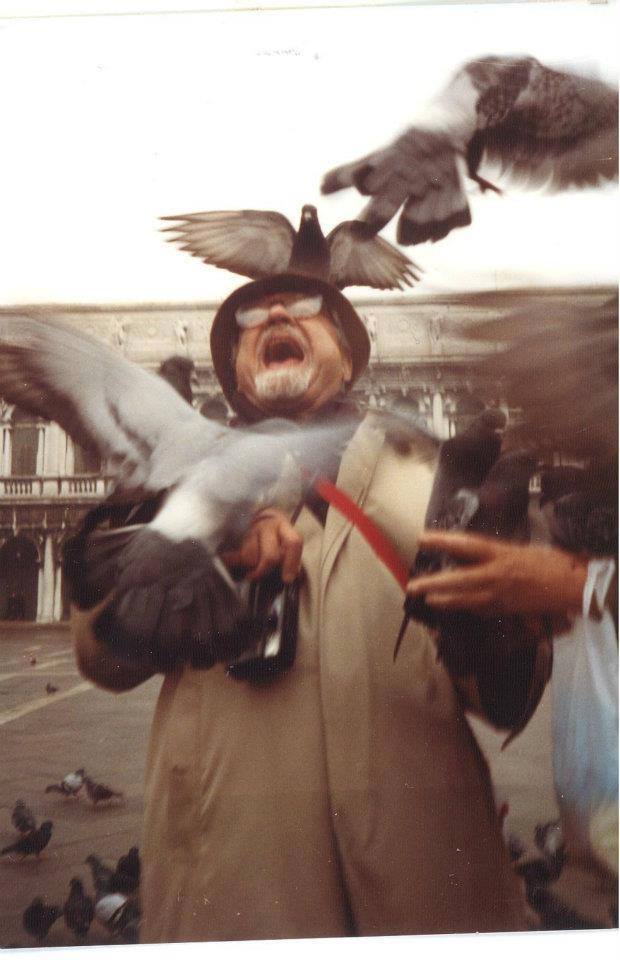R.I.P. Henry Gleitman
« previous post | next post »
 Henry Gleitman — a great researcher, teacher, and friend — died Wednesday at the age of 90.
Henry Gleitman — a great researcher, teacher, and friend — died Wednesday at the age of 90.
I will always remember him, vividly, as a wonderful person to talk with about any subject at all. And his breadth of knowledge, mental agility, and dramatic flair made him a famous and effective teacher. He taught at Swarthmore from 1948 to 1960, and at Penn from 1961 until his retirement a few years ago, presenting Psych 1 to tens of thousands of students; and the many editions of his introductory Psychology textbook brought his enthusiasm, erudition, and communicative skills to hundreds of thousands more.
A eulogy from the chair of Penn's psychology department described
the generations of undergraduates who filled his Introductory Psychology classes, often 3 or 4 hundred at a time, and loved and remembered him forever after. If they stayed in Philadelphia, they continued to stop him in the street and in local restaurants, always telling him how he established their love of the field of Psychology.
At a time when many professors at research universities worked hard to avoid the chore of teaching undergraduates, Henry sought it out, and by his successful example made teaching introductory courses a prize assignment that faculty members aspired to earn.
The chair's note added that
As a teacher of generations of graduate students, he had a profound and widely acknowledged influence on how they thought about human (and rat!) nature, and about how Psychology connected with the history of Western philosophy and science.
On Henry's Facebook page, Jeff Lidz wrote
Over the years, I learned mountains from Henry, including at least the following:
1) that even (or perhaps especially) linguists, should know something about rats;
2) that technical talks can and should be made accessible to someone with little background;
3) that ideas are criticallly important, but people and friendships are more important.
He was a magnificent teacher and a generous spirit. He will be sorely missed.
Ralph Vigoda ("For 50 Years, He Has Captivated Students They Now Return To Honor The Penn Professor", Philadelphia Inquirer 6/14/1996) quotes Judy Rodin, former president of Penn and now president of the Rockefeller Foundation:
"I was toted off to Penn to become a French major," she said of her freshman year, "but I was just smitten with psychology. A lot of that had to do with Henry. He was a spectacular and captivating lecturer, and really developed in so many students, year after year, an enormous thirst for learning about psychology and a desire to continue in the field. The class was just spellbound when he lectured."
Henry also made broad, deep, and lasting contributions in many areas of psychological research, as his numerous and widely-referenced publications attest. But his personal influence was (and is, and will be) enormously broader, deeper, and more lasting.
Update — a story, famous in our family, written up on request by Cindie McLemore:
In 1994, shortly after we’d bought our house and ordered a bunch of furniture, Mark’s dad Al planned a visit from Connecticut — so we planned a dinner party. The table was delivered just in time, along with a few special chairs covered in handwoven black leather. For our first dinner party in the new house we used hand-blown crystal wine glasses, which had sentimental value.
Al came, everyone arrived, we all got cozy at the table: Henry and Lila, Bill and Gillian, Ellen Prince, Al, Mark, and me. Right off the bat somebody passed a dish and knocked over a wine glass, which shattered. No problem, no problem, crystal on marble, what can you do. About 45 seconds later Al, who was sitting at the head of the table, knocked over his wine glass, which also shattered. What? Well, as he instructed me later, that’s about how long the host is supposed to wait before knocking over their own wine glass in solidarity with a guest who did. What a relief that somebody knew the protocol for breaking another glass! Ellen was jubilant: “Next thing you know the chandelier’s going to come crashing down right in the middle of the table!” Best memory of a smile on Ellen’s face hands down.
Then there was eating, but more importantly, there was talking. You could not wedge a voiceless velar stop in between the tightly overlapping turns at talk. I don’t want to make them sound impolite, but between Lila’s confidence, Al’s throat-clearing authority, and Mark’s booming bass, it wasn’t enough to know something about the pressing cog sci issue at hand. Sitting to my left, Henry leaned over the corner of the table and began talking to me about philosophy.
All the sudden Henry started sinking — and then he was on the floor! I jumped up to help him, but before anybody knew what was happening the chair had collapsed under him. Later we learned that two of the chairs hadn’t had their legs affixed properly before the leather strips were woven on; Mark, Al, and I held a subsequent chair test and discovered another one about to go.
OK, Henry’s on the floor, everyone’s in shock, and I’m mortified. But Henry pulls himself up to a proud height, raises his index finger, and says: “It vas a struggle between the chair und me, and I WON!”
Henry won, and the audience roared.
Thorin said,
September 5, 2015 @ 8:12 am
That is also an incredible photograph! What a person he must have been.
Eric said,
September 5, 2015 @ 9:32 am
He sounds like an exceptional person. I'm sorry for your loss.